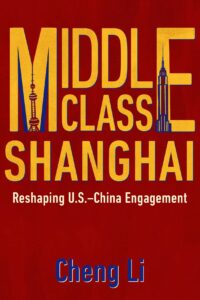
Book Talk | Middle Class Shanghai: Reshaping U.S.-China Engagement
The U.S. China relationship, after four decades of engagement, continues to worsen and many experts note that a new cold war is about to begin. The current deterioration of the bilateral relationship is the culmination of years of disputes, disillusionment, disappointment, and distrust between the two countries. Washington has legitimate concerns about Beijing’s excessive domestic political control and aggressive foreign policy stances, just as Chinese leaders believe the United States still has futile designs on blocking their country’s inevitable rise to great-power status.
Cheng Li’s Middle-Class Shanghai argues that American policymakers must not lose sight of the expansive dynamism and diversity in present-day China. The caricature of the PRC as a monolithic Communist apparatus set on exporting its ideology and development model is simplistic and misguided. Drawing on empirical research in the realms of higher education, avant-garde art, architecture, and law, this unique study highlights the strong, constructive impact of bilateral exchanges.
Combining human stories with striking new data analysis, Li addresses the possibility that the development of China’s class structure and cosmopolitan culture—exemplified and led by Shanghai—could provide a force for reshaping U.S.-China engagement. Both countries should build upon the deep cultural and educational exchanges that have bound them together for decades. The author concludes that U.S. policymakers should neither underestimate the role and strength of the Chinese middle class, nor ostracize or alienate this force with policies that push it toward jingoistic nationalism to the detriment of both countries and the global community.
This event is produced by the Washington State China Relations Fund (WSCRC’s sister organization) in collaboration with the Seattle Shanghai Expat Society.
About the Author
 Cheng Li is the director of the John L. Thornton China Center and a senior fellow in the Foreign Policy program at Brookings. He is also a director of the National Committee on U.S.-China Relations. Li focuses on the transformation of political leaders, generational change, the Chinese middle class, and technological development in China.
Cheng Li is the director of the John L. Thornton China Center and a senior fellow in the Foreign Policy program at Brookings. He is also a director of the National Committee on U.S.-China Relations. Li focuses on the transformation of political leaders, generational change, the Chinese middle class, and technological development in China.
Li grew up in Shanghai during the Cultural Revolution. In 1985, he came to the United States, where he received a master’s in Asian studies from the University of California, Berkeley and a doctorate in political science from Princeton University. From 1993 to 1995, he worked in China as a fellow sponsored by the Institute of Current World Affairs in the U.S., observing grassroots changes in his native country. Based on this experience, he published a nationally acclaimed book, “Rediscovering China: Dynamics and Dilemmas of Reform” (1997).
Li is also the author or the editor of numerous books, including “China’s Leaders: The New Generation” (2001), “Bridging Minds Across the Pacific: The Sino-U.S. Educational Exchange 1978-2003” (2005), “China’s Emerging Middle Class: Beyond Economic Transformation” (2010), “China’s Political Development: Chinese and American Perspectives” (2014), “Chinese Politics in the Xi Jinping Era: Reassessing Collective Leadership” (2016), and “Middle Class Shanghai: Reshaping U.S.-China Engagement” (Spring 2021). He is currently completing a book manuscript with the working title “Xi Jinping’s Protégés: Rising Elite Groups in the Chinese Leadership”.
Moderator
 Author Amy Sommers spent three decades as a China-focused lawyer, including 11 years working in Shanghai as an international law firm partner during a period of rapid economic development, social change and maturation in China’s legal system.
Author Amy Sommers spent three decades as a China-focused lawyer, including 11 years working in Shanghai as an international law firm partner during a period of rapid economic development, social change and maturation in China’s legal system.
In addition to her historical thriller “Rumors from Shanghai,” Amy has written nonfiction pieces, such as an op-ed on the approach the Biden administration would take in China, residential real property rights in Shanghai during the Cultural Revolution and afterwards, and a reference book to foreign investment on real property law in China. She is a frequent public speaker and recently presented on China’s shift from ‘strategic partner’ to ‘strategic competitor.’
Amy is a member of the National Committee of US-China Relations, and of the advisory committee for the recently established Vancouver Anti-Corruption Institute. From 2012-16, she served on the board of directors of anti-corruption nonprofit, TRACE International, Inc. She has held a range of leadership roles in the American Bar Association’s Section of International Law, is a fellow of the American Bar Foundation, and in 2016 received the Mayre Rasmussen Award for the Advancement of Women in International Law from the ABA Section of International Law in recognition for her contributions.
- Event Recording: https://youtu.be/llkBKjaxsoA